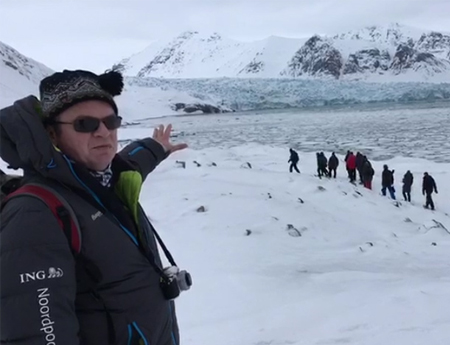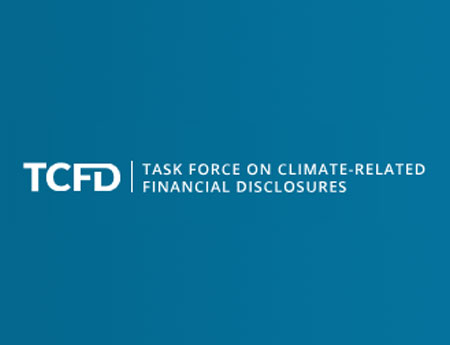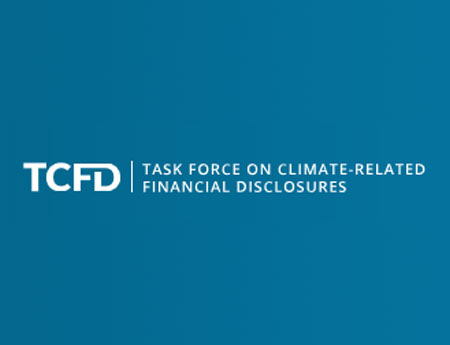A polar warning
9 November 2017
To save this planet, we need corporate leaders with guts, says polar explorer Bernice Notenboom. “It takes courage to say: let’s stop doing this.”
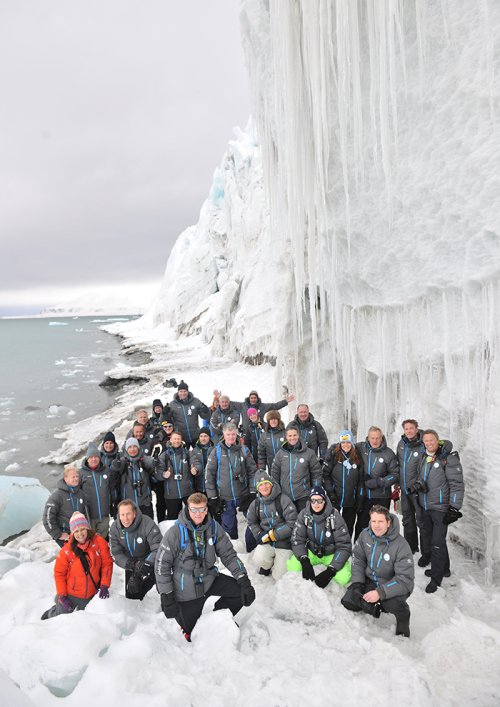
Bernice Notenboom (in red) with expedition members in the Arctic during the two-degree challenge trip in April 2017. “After four days, competitors became best friends.”
In her cozy apartment in Amsterdam, Bernice serves Himalaya tea. Yes, she still has all 10 fingers and toes, she says smiling – quite an achievement for a woman who climbed the Mount Everest, skied to the North Pole and the South Pole, and crossed the ice deserts of Siberia and Greenland.
“It’s because I take care. I go back when I think it’s getting dangerous. Maybe I’m a bit crazy, I take some risks, but I don’t gamble with my health.”
Maybe it’s also because Bernice, filmmaker, speaker and writer, has a bigger purpose. She wants to show the world the effects of climate change. And, as she writes on her website, “we have no time to lose — and seeing is believing”.
ING’s link with Bernice started in April 2017 with the two-degree challenge, an expedition to an area of the Arctic in Svalbard, Norway where global warming is happening faster than anywhere else on earth. The trip brought together around 50 companies that are working to combat climate change.
Since their return, these companies, including ING, have called upon the Dutch government to come up with legislation that will combat climate change over the long term.
So you put all these business people on some ships to Spitsbergen. What happened?
Imagine, these ships didn’t have Wi-Fi. After the first hours of digital detoxing, you noticed that people started talking, but were reserved in expressing themselves publicly. So I had brought climate scientists and people from NASA along to facilitate discussions. And then suddenly, all these CEOs were standing on the ice, listening to the science, seeing the glaciers – and it started. After four days, competitors became best friends, which led to collaborations. Practical things. Huge companies from different sectors agreed to buy green energy from the same provider. Others decided to start sharing office spaces and pool transport facilities. It’s those things that I had hoped for.
Why?
They are steps towards a sharing economy. We need a system change, from the traditional short term thinking that’s all about growth and profit, to a mentality of sharing and a longer term view. Currently we’re still too much stuck in old routines. For generations we’ve been doing the same old thing. And it’s extremely difficult to break free.
Companies are part of this system. How can they lead this change?
I see many inspired people in companies, who are willing to make rigorous steps. If they are CEOs or in other high positions, they can mobilise a lot of people. But too often ambitions still get blocked by other stakeholders who want to see returns on investment. If this means we need to keep doing what we’ve always done, for instance using fossil fuels, this is what will happen for many more years. That’s the system error I’m talking about. It takes courage to say: let’s stop doing this. I believe most companies want to change, they only don’t want to be the first.
Do you see leaders with guts?
Oh yes. Jerry Brown, the governor of California, who said that by 2030 they will be fully free of fossil fuel. That’s a state with 39 million people, bigger than Canada.
And why does everyone admire Tesla’s Elon Musk? Because he sets outrageous goals, everybody thinks he’s mad, but he just doesn’t listen and does everything to realise his dream.
Change will come from entrepreneurs like these. They are like polar explorers, courageous people with a grand vision who start on an adventure without knowing exactly what will happen. People who trust their intuition.
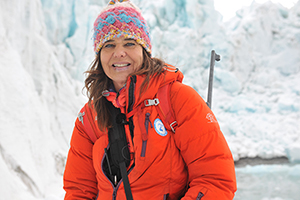
When the oceans heat up, there’s no way back.
– Bernice Notenboom
Banks have a special position. What would you do if you were a banker for a day?
I’d start a divestment programme to get out of fossil fuels, and an ambitious investing plan for renewable energy. The world just doesn’t need those polluting fossil fuels anymore, not even the maritime industry (Bernice this year made a critical film on the maritime industry, Sea Blind – Ed.). And I’d invest much more in the circular economy and waste management. Why do we keep putting things in plastics? We now even find plastic on the North Pole, in the stomachs of fish that we eat. The whole way of thinking needs to change.
So how is ING doing?
Let me say it this way, not everyone at ING will like everything I say. But I’m happy that you give me the opportunity to say these things, and listen. And that you show the intention to make the transition. I see true commitment and movement, for instance your divestment from the Dakota Pipeline project. Of course, I’d like to see things change faster, and if I can put a little extra pressure I won’t hesitate.
Few people doubt climate change is happening. Why is it so hard for the average consumer to change?
It’s because we don’t know how to deal with uncertainty. And the climate story is way too abstract. Billions of tons of CO2 emissions, what does it say? So we simplified the story by talking about temperature, the maximum of two degrees global warming we’ve committed to in Paris in 2015. That’s an easy concept to grasp, but still, many people don’t see the real issue here. They don’t feel the pain, yet. For us, at home, it’s easy to regulate how hot or cold we are, with our heating systems or air conditioning, but the planet can’t do this. And the North Pole regulates the temperature everywhere on earth.
OK, make us feel the pain – what if the North Pole melts?
Without ice on the North Pole the average temperature on this planet rises to 18, 19 degrees Celsius. That’s way too hot. An average of 16 degrees is ideal. When the oceans heat up this much, there’s no way back. Then eventually the icecap of Antarctica will start to melt, and the Greenland icecap and permafrost in Siberia will thaw. We may see sea level rising by tens of meters, extreme weather, dramatic changes to our food supply. Large parts of the planet that won’t be inhabited any more. That’s the planet we’ll leave to the generations born after us if we cross that tipping point.
Is there still time?
Hardly. To reach the two-degree target, we need to reduce our CO2-emissions by 50 percent before 2030. That sounds far away. But it’s only 13 years from now. Why not come up with a law that forces all companies to make a budget now, showing how they’re going to do their part of the reduction over time? Just as you save for retirement. We can make financial budgets for the future, why not for our climate?
What can ING do?
Wouldn’t it be great if ING becomes the bank that leads the way to a sustainable future? Why can’t you be that bank that thinks of the future generations and says: we want to be one of the frontrunners of that more sustainable economy, through our own actions and our financing? You have the size to make a difference, you are not a bank for the elite, you are for everybody. You can make this transition and reach millions of people. That gives you the power to change things. It’s a missed opportunity if you don’t do it.


